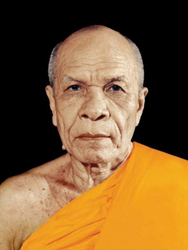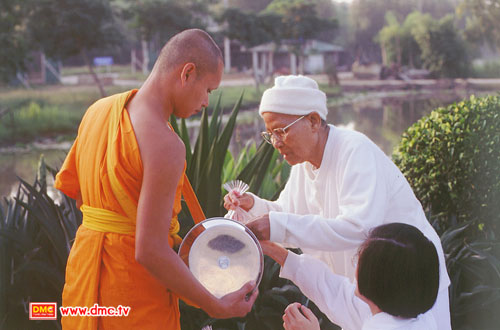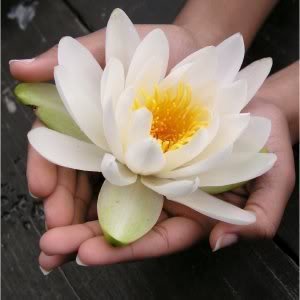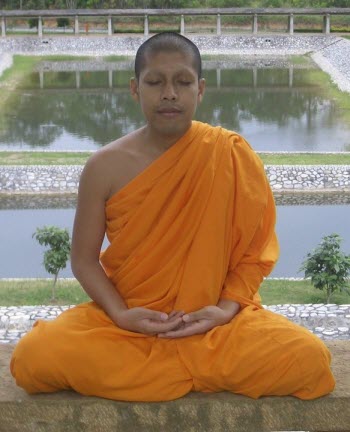Blessing Fifteen:
Generosity
Generosity

E. HOW MUCH TO GIVE
E.1 Duty of a Buddhist to support their religion
The Buddha specified the duty of a Buddhist householder towards members of the monastic community in the sixth of the “six directions” of the Siṅgalovāda Sutta, as follows:
1. kindly acts towards the monastic community
2. kindly words towards the monastic community
3. kindly thoughts towards the monastic community
4. by keeping an open house to the monastic community
5. supplying the monastic community with their material needs
In other words it is the duty of every Buddhist householder to perform acts of generosity towards the Saṅgha. The Buddha laid down the rule that monks must earn their livelihood by alms alone. Monks are not allowed to earn income by any other means. The Buddha’s intention by this rule was that monks be able to devote their time to their real duties of study and meditation in order to be:
1. pure in body, speech and mind and to be a worthy field of merit for the householders
2. worthy teachers to the householders
Of course the government could organize things so that people could support Buddhism out of their taxes in the same way the State finances the Church in many western countries, but because Buddhism has (like the Protestant Church) has always emphasized the importance of independence from “worldly” concerns such as political policy, the price of this freedom is that Buddhism must rely on the reciprocal relationship between monk and laity at a grassroots level which cannot be manipulated by any politician.
By supporting the monastic community, the householders maintain the intactness of the Triple Gem for perpetuity — for the peace and harmony of society and the world at large.
It is not difficult for well-intentioned householders to understand the importance of the first four duties of the householder towards the monastic community — however, in the society of the present day where even the media find it profitable to sensationalize the laxity of a miniscule minority of members of the monastic community — the repercussions are having a negative effect on the whole monastic community throughout the world. No small number of formerly dutiful householders exposed to such sensationalism have discontinued their support for the monastic community out of uncertainty as to which monks are practicing in earnest.
Thus it falls upon earnestly practicing monks to co-operate in trying to salvage the tarnished image of the monastic community — because if the faith of the Buddhist laity is allowed further to deteriorate, eventually the laity will lose their understanding of Buddhist principles — becoming capable of heinous social crimes or of defecting to other religions. Such people will only add to the fragmentation and internal divisions which already exist in society.
E.2 Managing your resources
When we talk of generosity [dāna] in this blessing we mean giving those things which are surplus to our needs. Some people might doubt as to how much they really need or might be unable to distinguish between ‘need’ and ‘want’ and hence the Buddha gave guidance about how householders should budget their earnings so that their generosity is neither reluctant nor a burden on the family expenditure. The Buddha taught (Ādiya Sutta A.iii.45) that the family budget should be divided into five as follows:
1. one part to support the immediate needs of yourself, your parents, your children, spouse, servants
2. one part to extend generosity towards your friends
3. one part which should be saved in case of emergency (for example fire, flood, excess taxation, theft or extortion by malevolent relatives)
4. one part which should be used for five sorts of dedication
1) for one’s extended family
2) for hospitality
3) for dedicating merit for the departed
4) for taxes
5) for dedicating merit to the things that you believe in according to your local custom (e.g. ascetics, animals, physical forces and elements, lower deities or higher deities depending on your culture)
5. one part to extend support to well-practicing monks and ascetics
The Buddha did not say that each part should be 20% of your earnings, but he taught that you should budget for each of these sorts of expenditure. As for the “working capital” which you have built up for yourself, the Buddha taught in the Siṅgalovāda Sutta (D.iii.180ff.) that you should apply one-quarter of your earnings for your immediate needs, one half should be reinvested in your business and the remaining quarter should be saved in case of emergency. It is up to each individual to decide how much of their income to use as “working capital” and how much to use for generosity. If you budget in this way, you will be able to practice generosity, giving neither too much nor too little.
E.3 Degree of Generosity
As mentioned above, generosity usually refers to giving away what is excess to one’s needs. Generosity thus trains one to overcome the tendency to want more and more without end — and to be able to distinguish between ‘need’ and ‘want’. If you have a big plate of food and you know that half will be enough for you, to give the other half to a hungry friend is generosity [dāna]. However in some places such as the “Four Virtues of the Householder” [gharavāsadhamma] (S.i.215; Sn.189) the Buddha exhorted his householders to train themselves even to be willing to sacrifice their own convenience for the good of others. In such a case, a hungry man might forgo the whole of his large plate of food for the benefit of a friend who has eaten nothing for three days. Such giving is a more developed form of generosity known as “self-sacrifice” [cāga]. In pursuit of the perfection of generosity the bodhisattva cultivated self-sacrifice to the point he was willing to sacrifice all his material possessions, but also parts of his body such as blood and eyes [upa-dāna-paramitā] and his own life [paramatta-dāna-paramitā].










